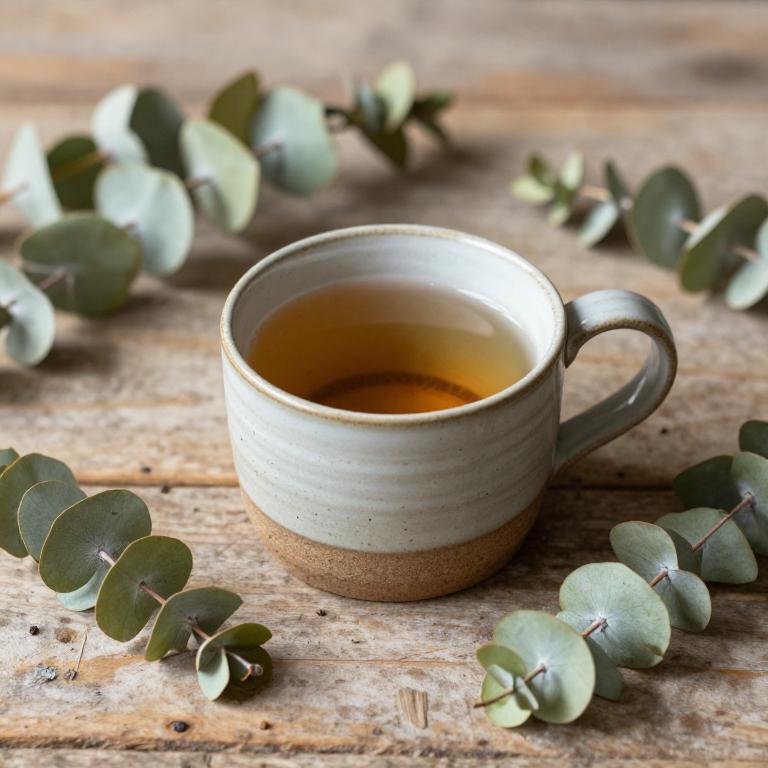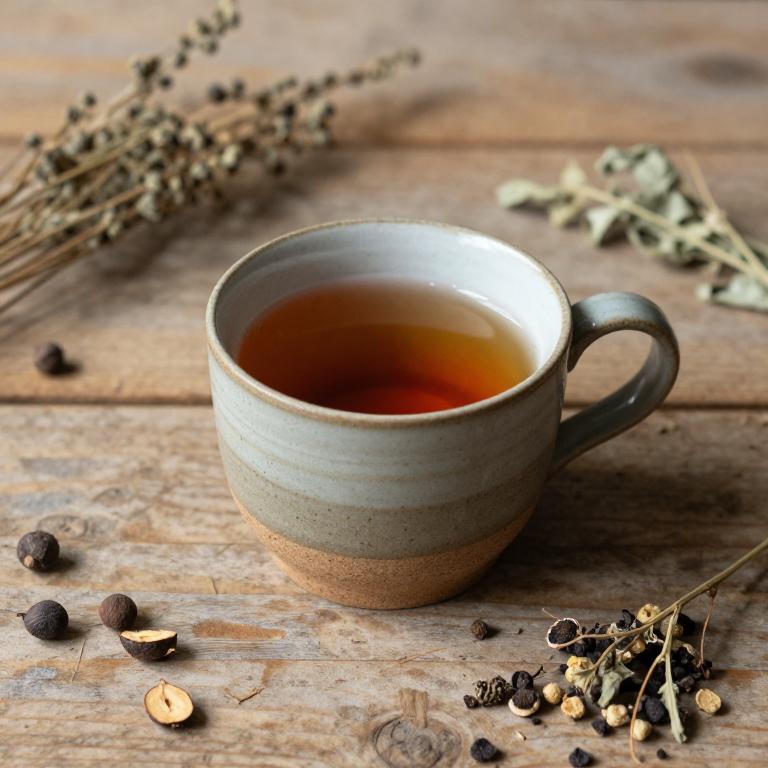10 Best Herbal Teas For Mucus In Throat

Herbal teas can be an effective natural remedy for soothing a sore throat and reducing mucus buildup.
Certain herbs like ginger, licorice root, and eucalyptus are known for their anti-inflammatory and expectorant properties, which help to loosen mucus and ease throat irritation. Drinking warm herbal tea can also provide comfort by numbing the throat and reducing coughing. Many herbal teas are caffeine-free, making them a safe option for long-term use.
It is advisable to consult a healthcare professional before using herbal remedies, especially if symptoms persist or worsen.
Table of Contents
- 1. Thyme (Thymus vulgaris)
- 2. Eucalyptus (Eucalyptus globulus)
- 3. Fennel (Foeniculum vulgare)
- 4. Salvia (Salvia officinalis)
- 5. Peppermint (Mentha piperita)
- 6. Stinging nettle (Urtica dioica)
- 7. Camellia (Camellia sinensis)
- 8. Rosemary (Rosmarinus officinalis)
- 9. Ginger (Zingiber officinale)
- 10. Ceylon cinnamon (Cinnamomum zeylanicum)
1. Thyme (Thymus vulgaris)

Thymus vulgaris, commonly known as thyme, is a popular herb used in herbal teas to help alleviate symptoms of mucus buildup in the throat.
The tea is valued for its antimicrobial and anti-inflammatory properties, which can help reduce irritation and soothe a sore throat. Thyme contains compounds like thymol and carvacrol that contribute to its expectorant effects, making it easier to expel mucus from the respiratory tract. When brewed as a tea, thyme can provide a warm, comforting drink that supports respiratory health.
However, it is advisable to consult a healthcare professional before using thyme tea, especially for individuals with chronic respiratory conditions or those taking medications.
2. Eucalyptus (Eucalyptus globulus)

Eucalyptus globulus, commonly known as the Tasmanian blue gum, is widely used in herbal teas to alleviate symptoms associated with mucus in the throat.
The essential oils in eucalyptus leaves contain compounds like cineole and limonene, which have decongestant and anti-inflammatory properties that help reduce throat irritation and loosen mucus. When brewed into a tea, eucalyptus globulus can soothe the respiratory tract and ease coughing by thinning mucus and promoting its expulsion. It is often combined with other herbs like ginger or licorice root to enhance its soothing effects.
However, individuals with allergies or respiratory conditions should consult a healthcare professional before using eucalyptus-based remedies.
3. Fennel (Foeniculum vulgare)

Foeniculum vulgare, commonly known as fennel, is a popular herb used in herbal teas to help alleviate symptoms associated with mucus buildup in the throat.
The essential oils in fennel, particularly anethol, have expectorant properties that can help loosen and expel mucus, making it easier to clear from the respiratory tract. Fennel tea is often recommended for its soothing effects on the throat, which can reduce irritation and inflammation caused by excess mucus. It is typically prepared by steeping dried fennel seeds in hot water, and the resulting tea can be consumed several times a day for relief.
However, individuals with allergies to related plants or those taking certain medications should consult a healthcare provider before using fennel tea as a remedy.
4. Salvia (Salvia officinalis)

Salvia officinalis, commonly known as sage, has been traditionally used in herbal teas to help alleviate symptoms related to mucus in the throat.
The plant contains compounds such as flavonoids and essential oils that may have anti-inflammatory and antimicrobial properties, which can soothe irritated throat tissues and reduce excess mucus production. When brewed as a tea, sage can provide a soothing effect, helping to ease coughing and discomfort caused by throat irritation. It is often recommended as a natural remedy for conditions like sore throats, colds, and respiratory infections.
However, it is important to consult with a healthcare provider before using sage tea, especially for prolonged periods or in individuals with certain medical conditions.
5. Peppermint (Mentha piperita)

Mentha piperita, commonly known as peppermint, is a popular herb used in herbal teas to help alleviate symptoms associated with mucus in the throat.
The essential oils in peppermint, particularly menthol, have expectorant properties that can help loosen and expel mucus from the respiratory tract. Peppermint tea is often recommended for its soothing effect on the throat, reducing irritation and easing coughing. It also has a cooling effect that can provide relief from throat inflammation and soreness.
However, it is important to consult a healthcare provider before using peppermint tea, especially for those with certain medical conditions or who are taking medications.
6. Stinging nettle (Urtica dioica)

Urtica dioica, commonly known as stinging nettle, has been traditionally used in herbal medicine for its potential health benefits, including its ability to help reduce mucus buildup in the throat.
When prepared as a tea, stinging nettle can act as a natural expectorant, helping to loosen and expel excess mucus from the respiratory tract. The plant contains various bioactive compounds, such as flavonoids and mucilage, which may contribute to its soothing and anti-inflammatory properties. To prepare the tea, the leaves are typically dried and steeped in hot water, and it is often consumed several times a day for best results.
While generally considered safe, it is advisable to consult with a healthcare professional before using stinging nettle tea, especially for individuals with allergies or those taking other medications.
7. Camellia (Camellia sinensis)

Camellia sinensis, the plant from which green and black teas are derived, contains bioactive compounds that may help reduce mucus in the throat.
The polyphenols found in Camellia sinensis, particularly catechins like epigallocatechin gallate (EGCG), possess anti-inflammatory and antioxidant properties that can soothe throat irritation and thin mucus. These compounds may help alleviate symptoms of respiratory conditions such as colds, allergies, or bronchitis by reducing mucus production and improving respiratory function. Drinking herbal teas made from Camellia sinensis, such as green or white tea, can provide a natural remedy for throat discomfort and excess mucus.
However, it is advisable to consult a healthcare professional before using Camellia sinensis-based teas for persistent or severe throat issues.
8. Rosemary (Rosmarinus officinalis)

Rosmarinus officinalis, commonly known as rosemary, is a fragrant herb that has been traditionally used for its medicinal properties, including its potential benefits for respiratory health.
Rosemary herbal tea is often recommended for its ability to help alleviate mucus buildup in the throat due to its expectorant and anti-inflammatory properties. The essential oils in rosemary, such as cineole and camphor, may help loosen mucus and reduce irritation in the throat. Drinking rosemary tea can also soothe the throat and provide a warming, comforting effect, making it a popular remedy for minor respiratory discomfort.
However, it is advisable to consult a healthcare professional before using rosemary tea, especially for individuals with chronic respiratory conditions or those taking medications.
9. Ginger (Zingiber officinale)

Zingiber officinale, commonly known as ginger, is a popular herbal remedy used in teas to help alleviate mucus buildup in the throat.
The active compounds in ginger, such as gingerol and shogaol, possess anti-inflammatory and antioxidant properties that can reduce throat irritation and ease the sensation of excess mucus. Drinking ginger tea can help stimulate mucus clearance by promoting circulation and reducing congestion in the respiratory tract. It is often recommended as a natural alternative to over-the-counter medications for those seeking relief from throat mucus without pharmaceuticals.
However, it is advisable to consult a healthcare professional before using ginger tea, especially for individuals with underlying health conditions or those taking other medications.
10. Ceylon cinnamon (Cinnamomum zeylanicum)

Cinnamomum zeylanicum, commonly known as cinnamon, is often used in herbal teas to help alleviate symptoms of mucus buildup in the throat.
The warming properties of cinnamon can help soothe irritation and reduce inflammation, making it beneficial for those experiencing throat discomfort. When brewed into a tea, cinnamon can act as a natural decongestant, helping to thin mucus and ease its passage. It is frequently combined with other herbs like ginger or honey to enhance its therapeutic effects.
While cinnamon tea is generally safe, it should be consumed in moderation and avoided by those with allergies or specific health conditions.